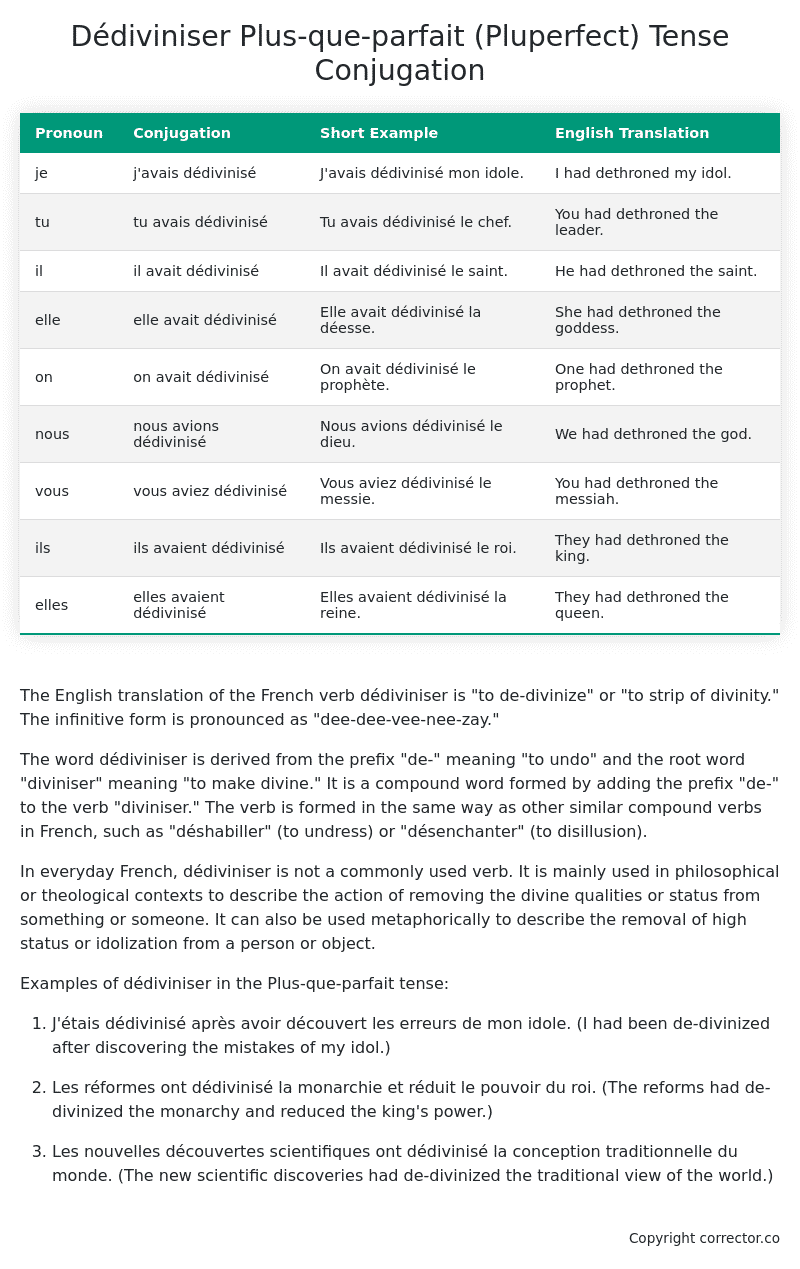Plus-que-parfait (Pluperfect) Tense Conjugation of the French Verb dédiviniser
Introduction to the verb dédiviniser
The English translation of the French verb dédiviniser is “to de-divinize” or “to strip of divinity.” The infinitive form is pronounced as “dee-dee-vee-nee-zay.”
The word dédiviniser is derived from the prefix “de-” meaning “to undo” and the root word “diviniser” meaning “to make divine.” It is a compound word formed by adding the prefix “de-” to the verb “diviniser.” The verb is formed in the same way as other similar compound verbs in French, such as “déshabiller” (to undress) or “désenchanter” (to disillusion).
In everyday French, dédiviniser is not a commonly used verb. It is mainly used in philosophical or theological contexts to describe the action of removing the divine qualities or status from something or someone. It can also be used metaphorically to describe the removal of high status or idolization from a person or object.
Examples of dédiviniser in the Plus-que-parfait tense:
-
J’étais dédivinisé après avoir découvert les erreurs de mon idole. (I had been de-divinized after discovering the mistakes of my idol.)
-
Les réformes ont dédivinisé la monarchie et réduit le pouvoir du roi. (The reforms had de-divinized the monarchy and reduced the king’s power.)
-
Les nouvelles découvertes scientifiques ont dédivinisé la conception traditionnelle du monde. (The new scientific discoveries had de-divinized the traditional view of the world.)
Table of the Plus-que-parfait (Pluperfect) Tense Conjugation of dédiviniser
| Pronoun | Conjugation | Short Example | English Translation |
|---|---|---|---|
| je | j’avais dédivinisé | J’avais dédivinisé mon idole. | I had dethroned my idol. |
| tu | tu avais dédivinisé | Tu avais dédivinisé le chef. | You had dethroned the leader. |
| il | il avait dédivinisé | Il avait dédivinisé le saint. | He had dethroned the saint. |
| elle | elle avait dédivinisé | Elle avait dédivinisé la déesse. | She had dethroned the goddess. |
| on | on avait dédivinisé | On avait dédivinisé le prophète. | One had dethroned the prophet. |
| nous | nous avions dédivinisé | Nous avions dédivinisé le dieu. | We had dethroned the god. |
| vous | vous aviez dédivinisé | Vous aviez dédivinisé le messie. | You had dethroned the messiah. |
| ils | ils avaient dédivinisé | Ils avaient dédivinisé le roi. | They had dethroned the king. |
| elles | elles avaient dédivinisé | Elles avaient dédivinisé la reine. | They had dethroned the queen. |
Other Conjugations for Dédiviniser.
Le Present (Present Tense) Conjugation of the French Verb dédiviniser
Imparfait (Imperfect) Tense Conjugation of the French Verb dédiviniser
Passé Simple (Simple Past) Tense Conjugation of the French Verb dédiviniser
Passé Composé (Present Perfect) Tense Conjugation of the French Verb dédiviniser
Futur Simple (Simple Future) Tense Conjugation of the French Verb dédiviniser
Futur Proche (Near Future) Tense Conjugation of the French Verb dédiviniser
Plus-que-parfait (Pluperfect) Tense Conjugation of the French Verb dédiviniser (this article)
Passé Antérieur (Past Anterior) Tense Conjugation of the French Verb dédiviniser
Futur Antérieur (Future Anterior) Tense Conjugation of the French Verb dédiviniser
Subjonctif Présent (Subjunctive Present) Tense Conjugation of the French Verb dédiviniser
Subjonctif Passé (Subjunctive Past) Tense Conjugation of the French Verb dédiviniser
Subjonctif Imparfait (Subjunctive Imperfect) Tense Conjugation of the French Verb dédiviniser
Conditionnel Présent (Conditional Present) Tense Conjugation of the French Verb dédiviniser
Conditionnel Passé (Conditional Past) Tense Conjugation of the French Verb dédiviniser
L’impératif Présent (Imperative Present) Tense Conjugation of the French Verb dédiviniser
L’infinitif Présent (Infinitive Present) Tense Conjugation of the French Verb dédiviniser
Struggling with French verbs or the language in general? Why not use our free French Grammar Checker – no registration required!
Get a FREE Download Study Sheet of this Conjugation 🔥
Simply right click the image below, click “save image” and get your free reference for the dédiviniser Plus-que-parfait tense conjugation!

Dédiviniser – About the French Plus-que-parfait (Pluperfect) Tense
Tense Formation
Common everyday usage patterns
Sequencing of past events
Background information
Hypothetical or reported speech
Interactions with other tenses
Summary
I hope you enjoyed this article on the verb dédiviniser. Still in a learning mood? Check out another TOTALLY random French verb conjugation!


